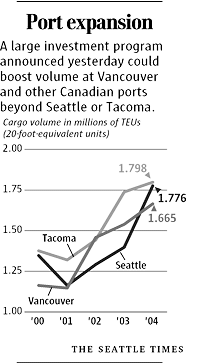forum
library
tutorial
contact

Canada to Boost Money for Ports
by Alwyn Scott, Seattle Times business reporterSeattle Times, October 22, 2005
|
the film forum library tutorial contact |

|
Canada to Boost Money for Portsby Alwyn Scott, Seattle Times business reporterSeattle Times, October 22, 2005 |
In a potential threat to Puget Sound ports, Canada pledged at least $498 million to expand British Columbia ports and improve railway connections across Canada and the U.S. to strengthen the country's status as a gateway to Asia.
"That's a down payment on what will be multibillion-dollar investment on many fronts," Stephen Owen, Canada's minister of western economic diversification, said in an interview.
 Immediate investments of as much as $160 million will pay for roads and railways, new customs agents and the creation of a council to direct port development and investment, the Canadian and provincial governments said yesterday.
Immediate investments of as much as $160 million will pay for roads and railways, new customs agents and the creation of a council to direct port development and investment, the Canadian and provincial governments said yesterday.
The government joins Canadian National Railway Co. and Canadian Pacific Railway Ltd., the country's main railroads, in upgrading links to ports in Vancouver and Prince Rupert to ship Asian cargo. Vancouver is Canada's largest port and the sixth biggest on the Pacific Coast behind Los Angeles, Seattle and three other U.S. cities, according to the American Association of Port Authorities.
Owen said a portion of the remaining $337 million is likely to go to expand the port at Prince Rupert, which is about 40 hours closer to Asia than other West Coast ports and has little of the congestion that impedes rail connections in Vancouver, Seattle and Tacoma. Prince Rupert received $25 million six months ago to expand container cargo facilities, Owen said. The improvements could shave several days off the time it takes to get cargo from Asia to Chicago and other cities. It also could make Canada attractive as a route from Asia to the Eastern U.S. and Europe, he said.
That could mean competition for Tacoma and Seattle, which ship more than half of their imported cargo inland, and are seeking funds to improve transportation links.
Owen downplayed those concerns. "I don't think any of us have to worry too much about competition," he said. "Asia is producing so much that we're all going to be scrambling to keep up with it."
But he said improving rail connections and reducing delays is vital in attracting cargo. "The most critical thing for movement of goods is not rates anymore, it's time."
The value of cargo handled by British Columbia ports will more than double by 2020 to $63 billion from $29 billion today, according to the government. Canada's imports from China surged to $20 billion last year from $3.9 billion in 1995, and Chinese cargo accounted for one-third of shipments to Vancouver's port last year in terms of weight.
British Columbia ports could see container traffic rise nearly fourfold in the next 15 years, to as much 7 million units a year. "That's a lowball, if anything," Owen said.
Seattle Port Commissioner Patricia Davis said the investment showed how Canada funds its ports substantially. "When people say there's no subsidy except here [in the U.S.], they're wrong," she said. "Canada realizes Vancouver is their portal to Asia and so the federal government is putting money into that."
learn more on topics covered in the film
see the video
read the script
learn the songs
discussion forum
